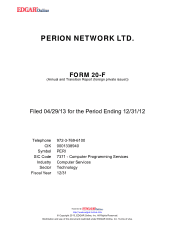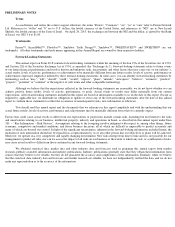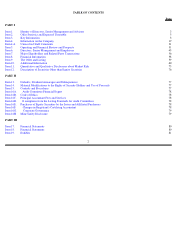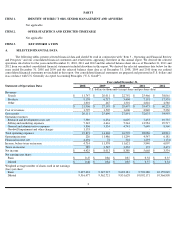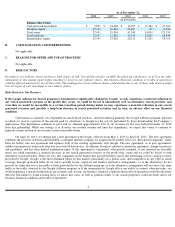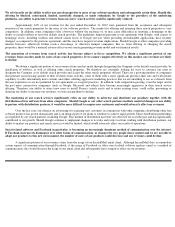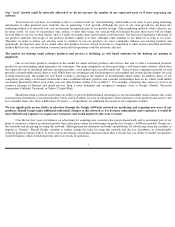Incredimail 2012 Annual Report Download - page 9
Download and view the complete annual report
Please find page 9 of the 2012 Incredimail annual report below. You can navigate through the pages in the report by either clicking on the pages listed below, or by using the keyword search tool below to find specific information within the annual report.
We rely heavily on the ability to offer our search properties to users of our software products and subsequently retain them. Should this
offering be blocked, constrained, limited, materially changed, or made redundant, by Google or the providers of the underlying
platforms, our ability to generate revenues from our users' search activity could be significantly reduced.
Approximately 63% of our revenues for the year ended December 31, 2012 were generated from the acceptance and subsequent
retention of our search properties by the users of our software products. The market for offering and retaining these search properties is very
competitive. In addition, some companies offer a browser without the existence of, or may cause difficulties in resetting, a homepage or the
ability to install toolbars or reset the default search provider. The guidelines imposed pursuant to our agreement with Google, with respect to
homepage resets, installing toolbars and default search resets to Google services when providing downloadable applications have recently
changed, as compared to the previous agreement, and this may have negative revenue implications. Should Google or other companies providing
internet browsers, effectively further restrict, discourage, or otherwise hamper companies, like us, from offering or changing the search
properties, there would be a material adverse effect on our search generating revenue model and our financial results.
The generation of revenues from search activity has become subject to fierce competition. We obtain a significant portion of our
revenues from searches made by users of our search properties. If we cannot compete effectively in this market, our revenues are likely
to decline.
We obtain a significant portion of our revenues from searches made through designating the Company as the default search provider, by
installation of toolbars, as well as offering other search properties. We therefore are constantly looking for ways to convince our users to
designate the Company as its default search provider and accept the other search properties offered. There are a growing number of companies
that generate an increasing amount of their revenues from searches, some of them with a more significant presence than ours and with greater
capability to offer substantially more content, and others utilizing aggressive marketing practices that we are unwilling to use as it detracts from
the user experience or are not permitted by our agreements or accepted practices. In addition, with competition growing, even the larger and in
the past more conservative companies (such as Google, Microsoft and others) have become increasingly aggressive in their search service
offering. Therefore, our ability to attract new users to install Perion’
s search assets and to retain existing users, could suffer, preventing or
delaying our ability to increase our revenues, or even causing them to decline.
The marketing of our search services significantly relies on our ability to advertise and distribute our products together with the
distribution of free software from other companies. Should Google or our other search partners institute material changes in our ability
to partner with distribution partners, it would be more difficult to acquire new customers and would adversely affect our revenues .
Over the last year, our reliance on advertising for acquiring new customers in conjunction with other companies distributing other free
software products has grown dramatically and is an integral part of our plans to continue to achieve rapid growth. These distribution partnerships
are regulated by our search partners, including Google. This method of distribution has been very effective for us in the past and has significantly
contributed to our growth. Should Google continue to implement changes to its rules and restrict us from working with distribution partners, our
ability to market our products and search services would be limited, which would adversely affect our results of operations.
Social related software and Facebook in particular, is becoming an increasingly dominant method of communication over the internet.
If Facebook increases its dominance over other forms of communication, or changes the way people share content and we are not able to
adapt our products to this new environment, the number of users of our products could decrease and our revenues could decline.
A significant portion of our revenues stems from the usage of our IncrediMail email client. Although IncrediMail does accommodate
certain aspects of communication through Facebook, if the usage of Facebook or other social related software replaces email as a method of
communication, this would decrease the usage of our email client and subsequently have a negative effect on our revenues.
5

